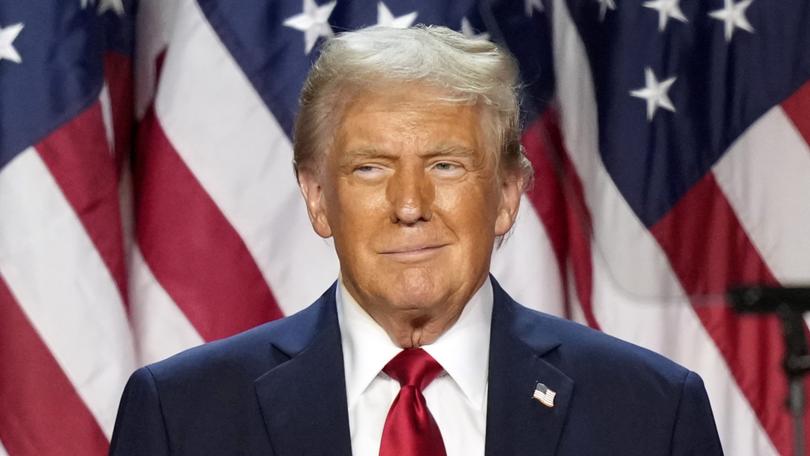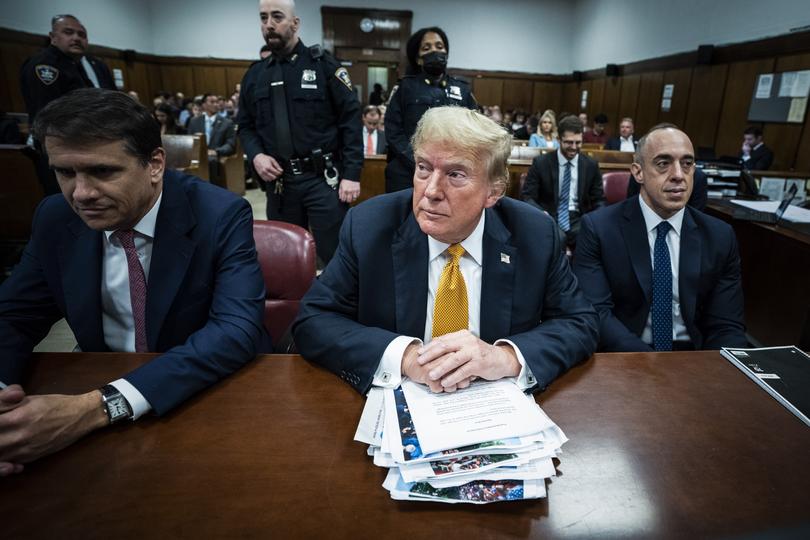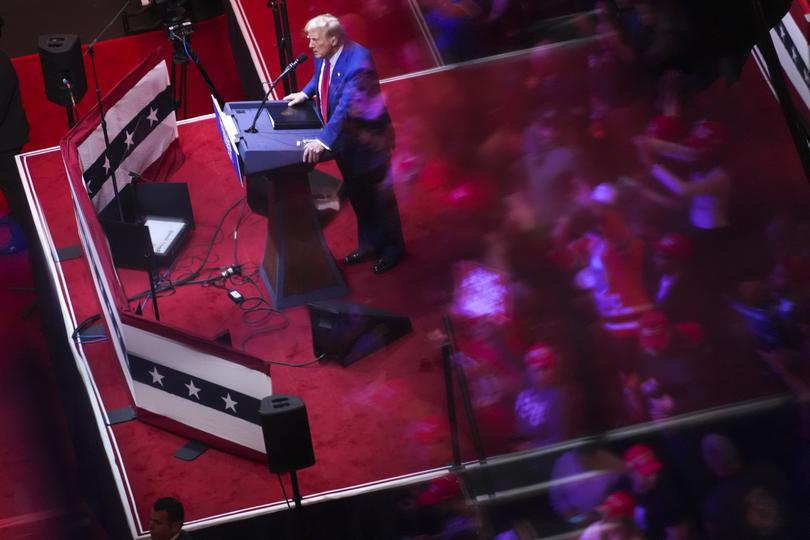THE WASHINGTON POST: Go bags, passports, foreign assets — Preparing to be a target of Donald Trump’s revenge
Donald Trump’s victory alone has set off alarms among some of his most outspoken critics, as well as within parts of the intelligence and national security communities he denigrated as the ‘deep state’.

A retired U.S. Army officer who clashed with senior officials in Donald Trump’s first White House looked into acquiring Italian citizenship in the run-up to this month’s election but wasn’t eligible and instead packed a “go bag” with cash and a list of emergency numbers in case he needs to flee.
A member of Trump’s first administration who publicly denounced him is applying for foreign citizenship and weighing whether to watch and wait or leave the country before the Jan. 20 inauguration.
And a former U.S. official who signed a notorious October 2020 letter suggesting that emails purportedly taken from a laptop belonging to Hunter Biden could be part of a “Russian information operation” is seeking a passport from a European country, uncertain about whether the getaway will prove necessary but concluding, “You don’t want to have to scramble.”
Sign up to The Nightly's newsletters.
Get the first look at the digital newspaper, curated daily stories and breaking headlines delivered to your inbox.
By continuing you agree to our Terms and Privacy Policy.All spoke on the condition of anonymity to avoid undermining their own preparations. The planning, they acknowledge, responds to a hypothetical worst case in which a second Trump presidency ushers in systematic suppression of free speech and criminalization of dissent. Trump’s victory alone has set off alarms among some of his most outspoken critics, as well as within parts of the intelligence and national security communities he denigrated as the “deep state” and accused of subverting his agenda.
Their anxiety has intensified amid the drumbeat of picks for critical Cabinet posts. Trump said Wednesday he would make Rep. Matt Gaetz, the Republican firebrand from Florida, his attorney general and Tulsi Gabbard, the former Democratic congresswoman from Hawaii and fervent critic of the foreign policy establishment who told world leaders to “embrace the spirit of aloha” after Russia’s full-scale invasion of Ukraine in 2022, his director of national intelligence, a role overseeing the nation’s 18 spy agencies.
“I feel like I’ve stepped through the looking glass,” said the retired Army officer who considered Italian citizenship.
Unlike the ordinary Americans who joke each election cycle about leaving the country when their preferred candidate loses, this group of anxious retired officers or government officials includes people whom the incoming president and his allies have subjected to withering criticism. Even before the election, some were subpoenaed by Trump-aligned members of Congress. Others were placed on watch lists compiled by pro-Trump activists.

Scarcely any described firm plans to leave the country. But they’re also not brushing off the threats as they keep track of personnel named to influential government jobs. Following the selection of Gaetz to lead the Justice Department, many are watching whether Kash Patel, a Trump loyalist who appended a “deep state” list to his 2023 book, “Government Gangsters: The Deep State, the Truth, and the Battle for Our Democracy,” lands a senior role at a top agency such as the FBI.
People on Patel’s list and other inventories of Trump antagonists have taken precautions ranging from the dramatic to the mundane. They include determining whether they’re eligible for foreign citizenship, examining the possibility of purchasing property abroad and considering whether to move money into overseas banks. The steps illustrate how seriously some potential targets of Trump’s retribution are taking the possibility that he or his allies could use the U.S. legal system against them, or that vigilante actors could take justice into their own hands.
“We’re monitoring who potential Cabinet members and core staff will be as we advise people,” said Mark Zaid, a national security lawyer who has represented government whistleblowers and has counseled clients about steps they might take now that Trump has been elected. “The reality is that, thankfully, this isn’t the 1930s; we have time to make decisions about what will be done and where people can go.”
Zaid said more will become clear soon: “The incoming administration is promising swift action on Day 1, so I don’t think it’ll take long to have a sense of what is planned. There are already lots of people starting to organize, especially lawyers, about seeking to uphold the rule of law come next January.”
Trump spokespeople did not respond to a request for comment. In his victory speech last week, Trump promised to “make America great again for all Americans” and declared, “It’s time to unite, and we’re gonna try. We’re gonna try. We have to try.”
But as a candidate, he described his domestic opponents as the “enemy from within.” And he argued that his perceived adversaries should face comeuppance, including both legal prosecution and extrajudicial action.
Trump said on a conservative talk show in the final days of the campaign that Jack Smith, the special counsel who has brought two criminal cases against him, should be “thrown out of the country.” He has called Liz Cheney, the former Republican lawmaker who campaigned alongside Democrat Kamala Harris, a “radical war hawk” who should face “nine barrels shooting at her.” And he has suggested that Gen. Mark A. Milley, the former chairman of the Joint Chiefs of Staff, should be executed, writing on social media that the general committed acts “so egregious that, in times gone by, the punishment would have been DEATH.”

A spokesman for the special counsel declined to comment. Smith is preparing to wrap up his cases in line with Justice Department policy preventing the prosecution of a sitting president, while reiterating in a recent filing, submitted in October, that his work has been nonpartisan.
A spokesman for Cheney did not respond to a request for comment. Milley, through an intermediary, also did not respond.
Retribution could include criminal investigations and prosecutions but also less theatrical penalties. Retired government officials could lose their security clearances, often important to private sector work, or confront burdensome tax audits.
Those risks have come to the fore as Trump loyalists compile lists of perceived enemies that include not just government officials and members of Congress but also their family members.
One of the most outspoken advocates of retribution is Ivan Raiklin, a former Green Beret and employee of the Defense Intelligence Agency who is close to Michael Flynn, the former Trump national security adviser who twice pleaded guilty to lying to the FBI but received a pardon in the waning days of Trump’s first term. Raiklin, who on social media calls himself Trump’s “Secretary of Retribution,” has touted a “Deep State Target List” that he says includes 600 people.
The fear is less that Raiklin lands a government role empowering him to carry out retribution, said people targeted by him, than that he incites extremist groups to act on their own. Raiklin did not respond to a request for comment.
Lists specific to certain government agencies have also circulated, such as a “Watch List” focusing on high-level officials at the Department of Homeland Security.
Since Trump’s victory on Nov. 5, prominent allies of the president-elect have threatened people at odds with the incoming commander in chief. Stephen K. Bannon, who briefly served as chief strategist in Trump’s first White House, reiterated his call for Milley to face sanctions over a phone call he placed seeking to reassure his Chinese counterpart in the aftermath of the pro-Trump attack at the U.S. Capitol on Jan. 6, 2021.

On his “War Room” show this week, Bannon said Trump should act against Milley on the first day of his presidency - “recall him to active duty and make him face a court-martial.” Milley believes Trump may act on that recommendation, according to a book by Washington Post associate editor Bob Woodward. “He’s a walking, talking advertisement of what he’s going to do,” Milley told former colleagues of Trump, according to the book, “War.”
Mike Davis, the founder of an organization focused on appointing conservative judges, wrote on social media, “I want to drag their dead political bodies through the streets, burn them, and throw them off the wall. (Legally, politically, and financially, of course.)” Later, he was more specific, warning Letitia James, the New York attorney general behind the $450 million civil fraud case against Trump, not to continue her efforts lest she face “prison for conspiracy against rights.”
In an interview, Davis said he wasn’t seeking a job in Trump’s administration and spoke only for himself. He said “any prosecutor, attorney, witness or other operative who has politicized and weaponized intel agencies or law enforcement” for political purposes “should face investigation and, if appropriate, prosecution.” Scrutiny, he added, should be aimed not just at James but at prosecutors and others involved in criminal cases against Trump in Washington, New York and Georgia.
A spokeswoman for James pointed to numerous judgments dismissing claims by Trump’s attorneys that her investigation was politically motivated. A New York judge overseeing the case went so far as to sanction Trump’s lawyers for repeating failed arguments that the attorney general’s office deemed “borderline frivolous even the first time defendants made them.”
Some of Trump’s congressional allies have cast doubt on the prospect of wide-ranging retribution.
Rep. Jim Jordan, the Ohio Republican and chairman of the House Judiciary Committee, said over the weekend on CNN, “I don’t think any of that’s going to happen because we’re the party who’s against political prosecution.” Still, Jordan said his message to the special counsel’s team was to preserve documents “so we, the Congress, who have a constitutional duty to do oversight, can see everything.”
Among those already bracing for reprisal are some of the signatories of a “Public Statement on the Hunter Biden Emails,” issued in October 2020. The statement responded to a story in the New York Post about a laptop once used by then-candidate Joe Biden’s son that the tabloid said included incriminating evidence about the Biden family.
The signatories, 51 people in the national security field, argued that the dissemination of emails from the laptop had “all the classic earmarks of a Russian information operation.” The signatories acknowledged that the material might be authentic but said they were suspicious - an intervention made on the eve of the 2020 election as major technology companies limited the spread of the story, enraging Republicans. Numerous news organizations, including The Washington Post, have since authenticated the emails and reported on their contents while not finding evidence to corroborate sweeping claims of wrongdoing by the elder Biden.
At a campaign rally in June, Trump said of the statement’s signatories, “They should be prosecuted for what they did.” And this week, in announcing that John Ratcliffe, his former Director of National Intelligence, would be his pick to run the CIA, Trump said his nominee stood against the “51 intelligence officials … lying about Hunter Biden’s laptop.”
Jordan, who heads a subcommittee on the “weaponization of the federal government,’’ launched an investigation last year into efforts to “discredit’’ the New York Post story, demanding documents from the signatories of the statement and, in some cases, deposing them behind closed doors.
“At the end of the day I don’t think any of us did anything wrong,” said Larry Pfeiffer, one of the signatories and a former chief of staff to CIA Director Michael V. Hayden. “We were just exercising our First Amendment rights on a situation we felt we had experience and expertise on.”
But the process itself was “stressful,” recalled Pfeiffer, who said he nonetheless planned to stay put.
Hayden, another signatory, also said he had no immediate plans to leave the country or take other drastic steps to protect himself from Trump’s retribution. “Not yet,” he wrote in an email before the election. “Maybe later.”
The former CIA director pointed to his advanced age of 79 and health issues as impediments to such measures. “But most of all I’m worried about the country,” he wrote. He said this week that his plans hadn’t shifted significantly since Trump’s victory.
John Brennan, also a former CIA director who signed the statement, was more emphatic.
“Trump certainly will seek retribution against his enemies, but I have no plans to decamp abroad,” he said. “I served my country for nearly three-and-a-half decades, so the likes of Trump will not chase me away.”

Another signatory who spoke on the condition of anonymity is applying for citizenship in a European country, saying the concern is about the investigations alone, even if they go nowhere.
“They’re going to start looking for something, and here’s the thing - the process is the punishment,” said the signatory, a former U.S. official. “They can bankrupt us just through the investigation.”
The irony, said this former official, is “we are people who manage risk for a living - life and death.” Now, the former official said, some of the country’s top national security officials are uncertain about how to protect themselves and their families from a threat that could come from their own government.
Another signatory said he could move to another country, but “that’s the break-glass time when the rule of law in America is completely falling apart.” The former official, who spent several years in conflict zones on counterterrorism missions, said he has received death threats over the 2020 statement.
At one point the GOP committee majority wanted to “haul all 51 of us” to a hearing, which never happened. “Is that what they want - a Russian trial with all of us in a cage?”
The decision to apply for foreign citizenship was a painful one for a veteran of Trump’s first administration who has publicly rebuked him and campaigned for Democrats.
“There’s a certain part of me that says, ‘I’m an American. I have every right to be in this country.’”
But this person started the application process over the summer, when Trump’s victory seemed likely. And the fear mounted as “deep state” lists began to circulate.
“Am I at the top of the list?” this person mused. “I don’t know, maybe.”
A former senior national security official who is on the “deep state” list compiled by Patel said there are certain factors that give him a degree of security, namely that he no longer works for the government or has a security clearance that could be revoked.
“They can’t take away my job, my health insurance, my pension,” the former official said.
But “what if he goes completely off the rails and decides one day to just start rounding up the enemies?” the former official added. “He could sign an executive order and say, ‘I’m suspending habeas and authorizing the temporary detention of people who pose a national security threat to the United States.’”
The former official, who has been in Trump’s crosshairs before, said: “Right now I don’t have any intention to go anywhere. I’m an American. I spent my entire career protecting and defending this country.”
But the former official said his family is worried. “They don’t want to go through what they’ve already been through again, and they worry about me being victimized by some baseless criminal investigation,” the former official said. So his family is having “hard conversations.”
And right now, he said, “everyone is just trying to figure out what the future holds.”
© 2024 , The Washington Post
